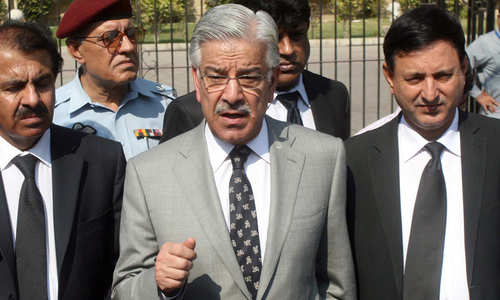LIKE a chain reaction, the dominos appear to be beginning to fall.
After the Supreme Court’s judgements disqualifying Nawaz Sharif for life from public office on the basis of Article 62(1)(f) of the Constitution, it was clear that others could be netted in the iqama and undeclared foreign earnings trap. To be sure, it is a trap of the politicians’ own making.
Whether done deliberately to conceal certain facts from the voter or out of a lack of care because nomination papers have not been scrutinised carefully in the past, it is clear that foreign work, residency permits and income that elected representatives are entitled to or are drawing in foreign countries have not been fully declared by several politicians.
The latest PML-N victim is Khawaja Asif, who has been doggedly pursued by a bitter constituency foe, Usman Dar of the PTI, for many years. Mr Dar’s quest to unseat arguably Sialkot’s most famous politician has finally been agreed to by the Islamabad High Court, which has declared Mr Asif ineligible for parliament. The now former foreign minister has vowed to take his appeal to the apex court, but it does not appear that the Islamabad High Court misinterpreted the test that the Supreme Court has ruled applicable.
Indeed, the PML-N and other parties should pay heed to the advice of the three-member bench.
Unlike other recent judgements, the Islamabad High Court verdict has effectively lamented the judicialistion of politics in the country. The bench has made clear that neither can nor should the people’s verdict, in the form of choosing their elected representatives, be easily overturned. The text of the judgement suggests a preference for politicians settling political disputes in political forums rather than rushing to the courts at the first opportunity.
There are at least two things the political leadership will need to turn their attention to.
First, following extensive improvements to the electoral system in the form of parliamentary legislation last December, political parties must educate their candidates about poll rules in the upcoming general election. In particular, the nomination forms to be submitted by candidates must be closely vetted. There is less room than ever for misdeclarations or forgetfulness in that area.
Second, the political leadership will need to look at overhauling Articles 62 and 63 of the Constitution and removing the remnants of dictators’ influence on the Constitution. The next lot of legislators should settle political disputes inside parliament.
Published in Dawn, April 28th, 2018














































